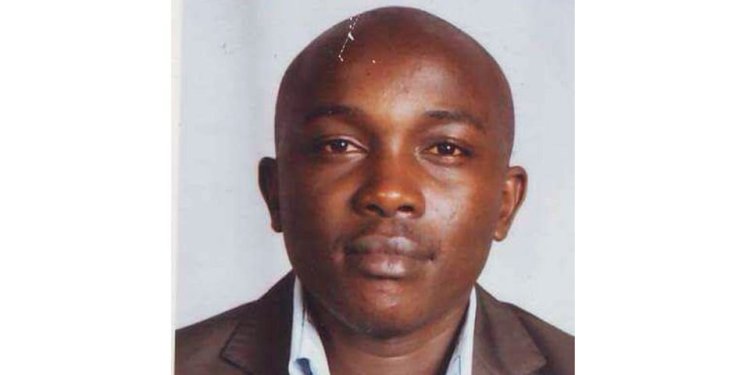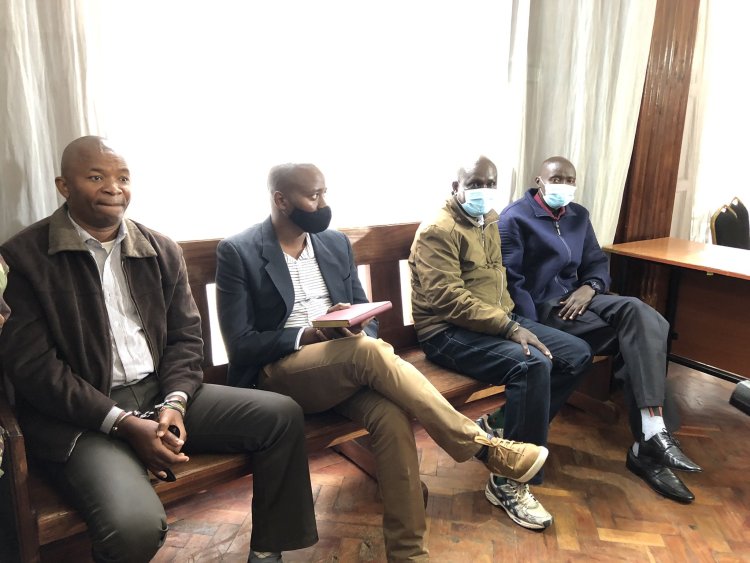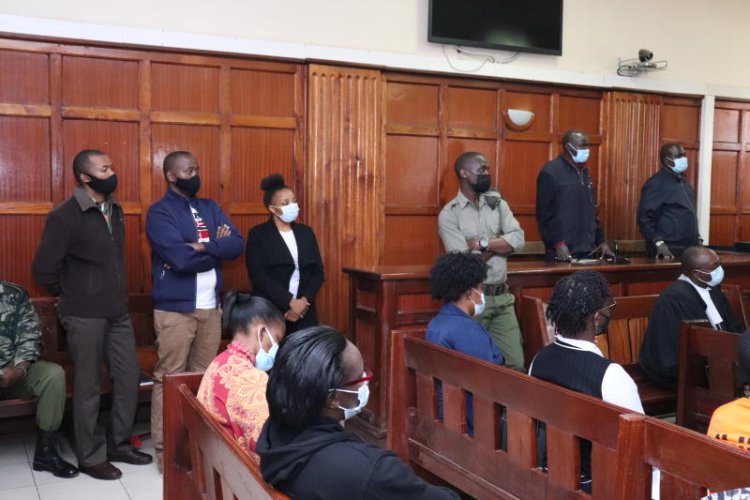Court Delivers Verdict in Willie Kimani Murder Case
The fifth accused, Administration Police (AP) officer Leonard Mwangi, has however been acquitted of all three counts of murder.

Police officers Fredrick Leliman, Stephen Cheburet, Sylvia Wanjiku and police informer Peter Ngugi have been found guilty over the brutal murder of lawyer Willie Kimani, his client Josephat Mwendwa and taxi driver, Joseph Muiruri on June 23, 2016.
The fifth accused, Administration Police (AP) officer Leonard Mwangi, has however been acquitted of all three counts of murder.
Mwangi however faces a separate murder charge alongside Leliman for killings perpetrated in Machakos County. They are accused alongside former Mavoko Officer Commanding Station (OCS) Stephen Lelei of the murder of Jacob Mwenda in Mlolongo.
Lady Justice Jessie Lessit in her judgement on Friday, July 22 ruled that the prosecution had proved beyond reasonable doubt that the three had plotted to murder their victims and went on to execute the well-oiled plan.

The accused persons in the murder of lawyer Willie Kimani from left are Peter Ngugi, Leonard Mwangi, Stephen Cheburet and Fredrick Leliman during the final judgement at Milimani law courts on Friday, July 22, 2022. /TWITTER
The quartet were found guilty on all three counts of murder. The judge revealed that the three had commonly conspired to harm the Mavoko three.
Lessit found that Leliman was the mastermind behind the murder and planned to execute the boda boda rider after the Independent Policing Oversight Authority (IPOA) got wind of the incident. Leliman had shot Mwenda during a police stop in 2015.
The judge also noted that evidence provided by the prosecution suggested that Leliman met one of the accused officers at a bar in Machakos, where he complained that the case would cost him his job.
Ngugi, the police informer, was also revealed to have backed away from the murder after he testified that he was assigned the role of tracking down the Mavoko three upon being informed that they were under investigation.
Lessit, before delivering the ruling, had noted that the defence team had requested that she withdraw herself from the case after she was promoted to the Court of Appeal. However, she insisted that the continued hearing of the murder case was constitutional as the court had taken too long on the matter.
"The court has taken five years to hear the case, hampered by many factors, and the most challenging being the pandemic which shut down courts for a certain period," she ruled.
She also noted that had she withdrawn herself from the case, it would have been an injustice to the family given that the murder sparked uproar across the country owing to Kimani's renowned status as a human rights lawyer.
The Mavoko three had vanished after they were last seen at a police station in Syokimau. Kimani and Mwenda had attended a court session in Mavoko after Mwenda had filed a case against a police officer.
Two weeks later, the bodies of the three men were found nearly 100 kilometres away in a river in Ol Donyo Sabuk.

Four police officers at a Milimani court on Monday, September 20, 2021, where the court ruled that they have a case to answer in connection with the murder of Lawyer Willy Kimani. /STANDARD DIGITAL
Timeline of events according to the Nation:
2015
April 10: Josephat Mwenda is stopped by police officer Fredrick Leliman, who accidentally shoots him in the hand. Three days later, Mwenda is charged with three counts: drug possession, gambling and resisting arrest.
Mwenda files a complaint against the officer at the Independent Policing Oversight Authority (IPOA) and Lawyer Willie Kimani begins investigating the case on behalf of International Justice Mission (IJM), an international NGO that helps vulnerable get justice.
December 14: Leliman and other police officers abduct Mwenda from his home at night. The next day, Mwenda is charged with six additional counts of traffic violations. Leliman claims Mwenda was violating the law while riding a motorcycle despite the fact that his gunshot injury to his hand prevented him from doing so.
2016
February 14: IJM officially takes on Mwenda's case Lawyer Willie Kimani begins investigating the case after it's assigned to him by the IJM, an international NGO that helps the vulnerable get justice.
Later the same month, Mwenda, his co-accused and lawyer Kimani are detained after a court hearing by police officers who say they want to question the men about a robbery with violence case that had happened in Meru. They are held for several hours and then released with no further explanation.
February 24: IJM writes to the office of the Inspector General of Police, IPOA and the Witness Protection Agency (WPA) to complain about Leliman’s misconduct and to request protection for Mwenda.
March 1: WPA decision on witness protection for Mwenda is pending – because he is an accused in the ongoing court case and not a victim, thus the law does not guarantee him protection.
March 16: IPOA summons Leliman to submit a statement about the claims of misconduct.
June 23: Lawyer Kimani, Mwenda and their taxi driver Joseph Muiruri are abducted after leaving court following a hearing on the traffic violation charges. The three are held in a police container at the station without being booked. Kimani manages to scribble a note on a piece of tissue. In it, he notes down the number of his client's wife and asks whoever sees it to tell her to get help.
The rider attempts to call Mwenda's wife, but she did not pick it up as she did not recognise the number. He throws away the tissue. By that evening, the IJM team mounts a search to find them, going to police stations and calling out their names, but they had been removed from the station at 7:30 pm, prior to the time IJM staff arrived.
It was estimated that the three men were killed at about 10:00 pm.
June 24-29: A missing persons report is filed. IJM staff and police continue to search in police stations and morgues. The men's mobile phones are found scattered. Details of the story enter the public sphere creating an uproar and lawyers in Kenya go on strike. IJM and Police Reforms Working Group (PRWG) publish a press release on June 29.
June 30-July 1: The bodies of Willie, Joseph and Josephat are discovered in a river in Ol Donyo Sabuk.
June 30: The Law Society of Kenya (LSK) files a habeas corpus application requiring persons in police custody to be produced in court. The application seeks to have the three missing men produced alive or dead (at this point, the discovery of their bodies had not been announced).
Later, the bodies are positively identified and IJM holds a press conference to announce the deaths.
July 1-5: Four police officers are detained in connection with the killings.
July 4-8: Lawyers strike and hold marches to protest extrajudicial killings. IJM staff join LSK in the marches.
July 8: Memorial service for Willie, Joseph and Josephat. Gary Haugen, the CEO of IJM, speaks.
July 9: Willie Kimani is buried.
July 11: Josephat Mwenda is buried.
July 18: Four police suspects are formally charged.
August 11: Judgement for habeas corpus filing finds that the police failed to act on Mwenda's IPOA complaint, says the men might have been alive if they did.
August 23: A 5th suspect, a civilian, is charged.
November 10: Trial starts.
2017
May: Machozi Ya Jana, a song, by Juliani, is released to bring attention to police abuse of power.
June: First-anniversary commemoration. Community dialogues are held to allow neighbourhoods with high levels of police abuse of power to share their experiences – 68 cases of what appears to be Extrajudicial killings (EJKs) or Enforced Disappearances (EDs) were identified, and 22 of these case later formed the basis of a class action suit. The dialogues were attended by police representatives.
July: IJM and partners in the civil society including the Police Reform Working Group (PRWG-K) launch an online petition for the removal of Deputy Police IG Samuel Arachi from office. They submit a petition with demands to the President of Kenya to “secure justice for three and safety for all.” At this point, 40,000 people have signed the petition.
2018
January: Deputy IG Arachi is removed.
August: Missing Voices is established by civil society groups to compile and share data on police killings and disappearances.
September: President Uhuru Kenyatta announces far-reaching police reforms, including the streamlining of the police command structure to allow greater oversight and accountability. Members of the PRWG-K, including IJM, are invited to give their views on the reforms.
November: A class-action suit is filed by IJM and 22 victims of extrajudicial killings and disappearances.
2020
February: ODPP collaborates with IPOA to commence the development of Standard Operating Procedures (SOPs) to streamline and enhance efficiency in investigating and prosecuting cases of human rights violations by police.
June 8: Decision to Charge guidelines are released. The guidelines will protect victims like Mwenda against charges brought by police that have no evidence.
October: In response to the class-action suit, the court orders the Inspector General to investigate 22 cases of police killings that took place between 2014 and 2017.

Justice Jessie Lessit reading the verdict in lawyer Willie Kimani's murder case at the Milimani High Court on Friday, July 22, 2022. /TWITTER






